How to Use Adobe Illustrator to Design Clothes
Why Do Designers Need to Learn Them?
Learning Illustrator and Photoshop
Our tutorials will teach you everything you need to know to use Adobe Illustrator and Photoshop for fashion design! Our easy to follow, step-by-step PDF eBooks will teach you to how to use these CAD fashion design programs to create professional fashion design projects, whether you're on the job, or creating a fashion design portfolio.
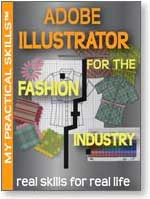
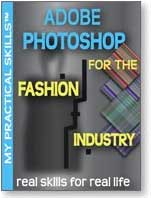
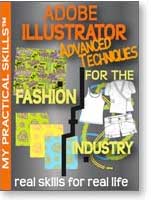
Adobe Illustrator for the Fashion Industry, will teach you how to use Adobe Illustrator to draw flat sketches, fill them with color & fabric prints, assemble presentation boards etc. Our Adobe Illustrator Advanced Techniques takes those skills even further, teaching how to create seamless pattern swatches, custom brushes for trim & stitching etc., and apply shading and other effects to your fashion sketches.
Our Adobe Photoshop for the Fashion Industry ebook teaches how to scan and prepare fabrics to create a clean repeat, create textile design repeats from scratch, how to fill shapes and areas of a sketch with a pattern repeat, assemble presentation boards etc.
Why Do I Need to Learn Illustrator & Photoshop?
Adobe Illustrator and Adobe Photoshop are two of the most commonly used CAD (Computer Aided Design) software programs in the fashion industry due to their versatility and affordability. In fact, it's rare to encounter classifieds for fashion designer jobs that don't list Adobe Illustrator and Photoshop as requirements. When used in combination with one another, these two programs provide just about all the tools an apparel designer needs to draw fashion design sketches, technical flat sketches, CAD presentations (rendered flat sketches), create and modify textile designs, repeats and colorways, design embroidery, graphic artwork, and more!
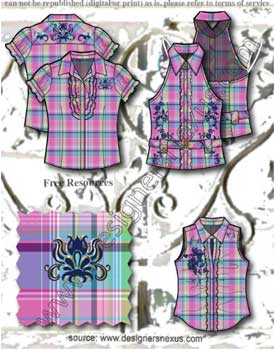
Adobe Illustrator
Adobe Illustrator is a vector-based program, which means that artwork can be scaled and printed at any size and resolution while maintaining full detail and clarity. This aspect makes the program ideal for producing fashion flat sketches, CAD sketch presentations, fashion illustrations and other images that are commonly resized and rearranged for various presentation purposes.
Some notable advances in Illustrator over the past few years continue to make it faster and easier to create fashion sketches, CADs and other projects. The "Live Trace" feature, introduced in CS2, allows users to easily convert photos, scans, and bitmap images into editable vector files. Also introduced in Illustrator CS2 is the "Live Paint" feature, which enables fashion designers to fill apparel sketches with colors and patterns using only a few simple clicks. Live Paint has completely revolutionized – and simplified – the way fashion designers draw and render fashion sketches, since it eliminates the need to draw closed shapes!
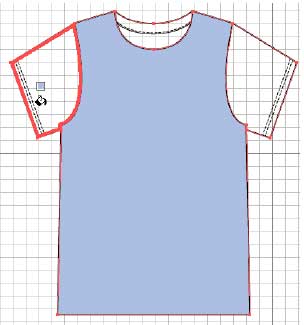
With CS3, Adobe Illustrator introduced "Live Color", a feature that allows designers to explore and apply color variations by selecting any artwork and interactively editing the colors to see results and apply them immediately. The "Color Guide" feature also allows designers to select tints, shades and harmonious color variations quickly and easily. As you can imagine, these features come in extremely handy when working with textile design colorways and graphic artwork designs. The Eraser Tool was also added, making it easy to erase fill areas (a painful process in previous versions).
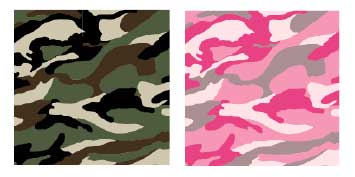
CS4 brought in the Blob brush, which lets users draw with fills only (no strokes), and transparency in gradients. In CS5, the newest version in the Adobe Creative Suite, the Shape Builder tool was introduced, allowing designers to easily create custom shapes. The Bristle Brush tool was also added, allowing designers to create fluid, paint-like strokes, as well as the Width tool, which enables a single path to vary in thickness. Both tools are great for creating fashion illustrations with the look of a hand sketch, but the editing flexibility of a CAD sketch!
Sketching
Some fashion designers also invest in a large drawing tablet (such as 9″x12″ or 12″x12″), which simulates real freehand drawing by translating each pen stroke onto your computer screen. Eliminating the scanning process, a drawing tablet makes it quite easy to sketch croquis and fashion illustrations directly into the computer and render them with various effects. While a tablet is great for projects with fine detail, such as embroidery layouts, or fashion illustrations, it is not a necessity. With practice, great detail and precision can also be achieved using your mouse.
Adobe Photoshop
When combined with Illustrator, Adobe Photoshop adds to the versatility of your fashion design projects, allowing you to work with various bitmap images as well as imported Illustrator images. You can easily perform color changes in fabric textures such as denim, twill, or sweater stitches, and add realistic shadows and highlights to presentations without losing texture detail. Complex patterns can be scanned to make simple color modifications, and more realistic plaid repeats and colorways can be created from scratch. Fashion designers can create original graphic artwork either through freehand drawing, or by applying various techniques like watercolor, airbrushing, charcoal and other artistic effects to existing images.
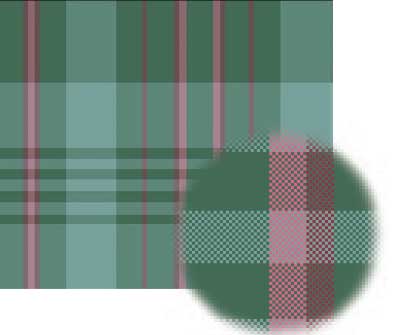
While Adobe continues to update its Creative Suite with new tools and features every few years, the core skills remain the same throughout all versions, so it's important for fashion designers to have a solid foundation in these CAD fashion design programs.
Check out our ebooks to learn how to use Adobe Illustrator & Photoshop to draw flats, fill sketches with fabrics, recolor textile designs, create seamless patterns and other examples mentioned above. Our free Photoshop for Fashion video tutorials also provide a thorough introduction to the Photoshop workspace for beginner and intermediate learners and serve as a great companion to our e-books!



How to Use Adobe Illustrator to Design Clothes
Source: https://www.designersnexus.com/fashion-design-industry-information/adobe-illustrator-photoshop-fashion-design/
0 Response to "How to Use Adobe Illustrator to Design Clothes"
Postar um comentário